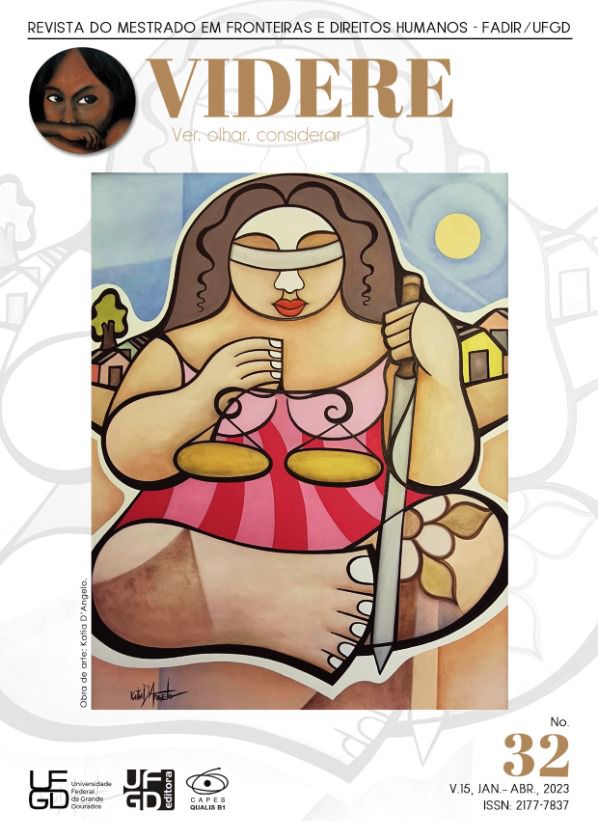A cooperação jurídica internacional para controle e prevenção da corrupção
DOI:
https://doi.org/10.30612/videre.v15i32.17014Palavras-chave:
Cooperação jurídica internacional, Corrupção, Democracia, GlobalizaçãoResumo
O artigo tem por objetivo analisar a articulação entre instrumentos jurídicos, instituições nacionais e organizações internacionais como mecanismo para enfrentamento de problemas sociais contemporâneos, como é o caso da corrupção. Justifica-se o trabalho, considerando o contexto da globalização, em que se evidenciou a necessidade do desenvolvimento de estratégias de controle integradas e capazes de potencializar a atuação de cada país. A cooperação internacional é um mecanismo fundamental para a concretização das políticas preventivas e repressivas em matéria de corrupção, trazendo benefícios para os Estados no que tange a recuperação dos bens e valores desviados pela prática delitiva. Sendo assim, a Convenção das Nações Unidas contra a Corrupção, dentre suas diversas disposições, estabelece um conjunto de regras e procedimentos que buscam viabilizar a cooperação internacional entre os países signatários. O método dedutivo e de revisão bibliográfica conduziram a pesquisa no sentido de verificar os ganhos proporcionados pelas iniciativas conjuntas supranacionais.
Downloads
Referências
BECHARA, Ana Elisa Silva Liberatore; FUZIGER, Rodrigo José. A Política Criminal Brasileira no Controle da Corrupção Pública. In: BERDUGO GÓMEZ DE LA TORRE, Ignacio; LIBERATORE S. BECHARA, Ana Elisa (coord.). Estudios sobre la corrupción. Una reflexión hispano brasileña. Salamanca: Centro de Estudios Brasileños, 2013.
BERDUGO GÓMEZ DE LA TORRE, Ignacio; BECHARA, Ana Elisa Liberatore Silva. O controle da corrupção: a experiência espanhola. In: Direito penal e processo penal: parte especial, v. 3. São Paulo: Revista dos Tribunais, 2015.
BERDUGO GÓMEZ DE LA TORRE, Ignacio. FABIÁN CAPARRÓS, Eduardo. Corrupción y derecho penal: nuevos perfiles, nuevas respuestas. Revista Brasileira de Ciências Criminais. vol. 81. p. 7-35. São Paulo: Revista dos Tribunais, nov. 2009.
BRASIL. Decreto nº 5.687, de 31 de janeiro de 2006. Promulga a Convenção das Nações Unidas contra a Corrupção, adotada pela Assembleia-Geral das Nações Unidas em 31 de outubro de 2003 e assinada pelo Brasil em 9 de dezembro de 2003. Brasília, DF: Presidência da República, [2006]. Disponível em: http://www.planalto.gov.br/ccivil_03/_ato2004-2006/2006/decreto/d5687.htm. Acesso em 03/08/2020. Acesso em: 04/08/2022
BRASIL. Ministério Público Federal. Relatório de Gestão – Secretaria de Cooperação Internacional (Set/2013 – Set/2017). DF: Brasília. 2017. 116p. Disponível em: http://www.mpf.mp.br/atuacao-tematica/sci/dados-da-atuacao/relatotio-de-gestao/docs/relatorio-de-gestao-sci-2013-2017-versao-condensada. Acesso em 04/08/2022.
BRASIL. Ministério Público Federal. Atuação Internacional do Ministério Público Federal: Relatório de Gestão 2017-2019. DF: Brasília. 2019. 84p. Disponível em: http://www.mpf.mp.br/atuacao-tematica/sci/dados-da-atuacao/relatotio-de-gestao/docs/relatorio-de-gestao-sci-2017-2019. Acesso em 04/08/2022.
CONTIPELLI, Ernani. Constitucionalismo Climático Global. Revista Justiça do Direito, Brasil, v. 32, n. 2, p. 278-300, 24 out. 2018.
FAORO, Raymundo. Os donos do poder – formação do patronato político brasileiro. 3ª ed. São Paulo: Globo, 2001.
FERRAJOLI, Luigi. Criminalidad y globalización. Boletín Mexicano de Derecho Comparado, México, v. 39, n. 115, p. 301-316, abr. 2006.
GIDDENS, Anthony. O Mundo na Era da Globalização. Tradução: Saul Barata. 6 ed. Lisboa: Editorial Presença, 2006.
HABERMAS, Jürgen. A Constelação Pós-Nacional. São Paulo: Littera Mundi, 2001.
JORGE, Guillermo. Cooperación Internacional con fines de Decomiso del Producto del Delito. In: _________, et. al. Recuperación de Activos de la Corrupción. Ciudad Autónoma de Buenos Aires: Del Puerto, 2008.
OLMOS, Eduardo Alonso. Recuperación de Activos en casos de corrupción: cooperación civil internacional. 2013. Tesis (Master en Corrupción y Estado de Derecho) – Universidad de Salamanca, Salamanca, 2013.
RODRÍGUEZ GARCÍA, Nicolás. Corrupción, Estado De Derecho y Poder Judicial: Retos y Límites de las Iniciativas Supranacionales e Internacionales de Asistencia e Cooperación Judicial Penal; In: BERDUGO GÓMEZ DE LA TORRE, Ignacio; LIBERATORE S. BECHARA, Ana Elisa (coord.). Estudios sobre la corrupción. Una reflexión hispano brasileña. Salamanca: Centro de Estudios Brasileños, 2013.
RODRÍGUEZ GARCÍA, Nicolás. Recuperación de activos frente a la corrupción en el nuevo orden mundial globalizado. In: CÁRDENAS, Leonardo Bolaños; GUDIÑO, Alejandro Romero (coord.). Fiscalización, Transparencia y Rendición de Cuentas. Tomo 4. México, 2017.
ROSA, Rafael Arouca. O confisco sem condenação penal como medida de recuperação dos bens e valores instrumentos ou produtos da lavagem de ativos. 2015. Dissertação (Mestrado em Direito) – Faculdade de Ciências Humanas e Sociais, Universidade Estadual Paulista “Júlio de Mesquita Filho” (FCHS/UNESP), Franca, 2015.
Downloads
Publicado
Como Citar
Edição
Seção
Licença

Este trabalho é licenciado sob uma licença Creative Commons Attribution-NonCommercial-ShareAlike 3.0 Unported License.
Os autores devem aceitar as normas de publicação ao submeterem a revista, bem como, concordam com os seguintes termos:
(a) O Conselho Editorial se reserva ao direito de efetuar, nos originais, alterações da Língua portuguesa para se manter o padrão culto da língua, respeitando, porém, o estilo dos autores.
(b) Autores mantém os direitos autorais e concedem à revista o direito de primeira publicação, com o trabalho simultaneamente licenciado sob a Atribuição-NãoComercial-CompartilhaIgual 3.0 Brasil (CC BY-NC-SA 3.0 BR) que permite: Compartilhar — copiar e redistribuir o material em qualquer suporte ou formato e Adaptar — remixar, transformar, e criar a partir do material. A CC BY-NC-SA 3.0 BR considera os termos seguintes:
- Atribuição — Você deve dar o crédito apropriado, prover um link para a licença e indicar se mudanças foram feitas. Você deve fazê-lo em qualquer circunstância razoável, mas de nenhuma maneira que sugira que o licenciante apoia você ou o seu uso.
- NãoComercial — Você não pode usar o material para fins comerciais.
- CompartilhaIgual — Se você remixar, transformar, ou criar a partir do material, tem de distribuir as suas contribuições sob a mesma licença que o original.
- Sem restrições adicionais — Você não pode aplicar termos jurídicos ou medidas de caráter tecnológico que restrinjam legalmente outros de fazerem algo que a licença permita.



















